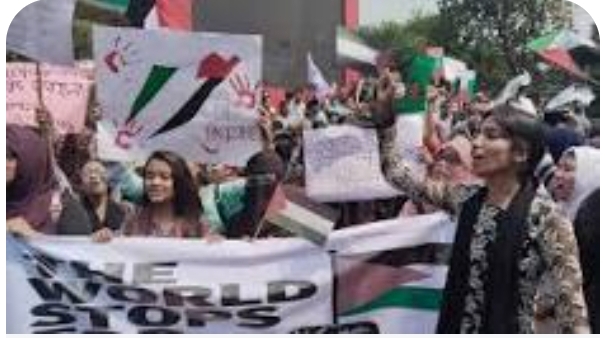Dhaka : In a sweeping display of solidarity with the Palestinian people, Bangladesh witnessed massive protests across the country on Monday, as students, political activists, and citizens joined the global strike titled “The World Stops for Gaza.” From Dhaka to Chattogram, Bogura to Bandarban, thousands took to the streets demanding an end to Israel’s ongoing genocide in Gaza and calling for justice for the victims.
The movement, spearheaded by student groups and backed by several political and social organizations, saw academic institutions, offices, and public spaces transformed into zones of resistance. In Dhaka, protest marches began early in the morning near the US Embassy in Gulshan, with students from United International University, Presidency University, BUET, BRAC University, and Dhaka University holding rallies, chanting slogans like “Free, Free Palestine” and “Stop Genocide in Gaza.”
Placards and Palestinian flags filled the air, while slogans condemning Israeli Prime Minister Benjamin Netanyahu and US policies echoed throughout the diplomatic zone. In some places, effigies of Netanyahu were carried through the streets as demonstrators demanded war crime trials for Israeli leaders.
The strike extended nationwide. In Chattogram, students from medical and government colleges led processions calling for global solidarity. Similar scenes were witnessed in Narsingdi, Cumilla, Chandpur, and Pabna, where Islamic student groups and ordinary citizens joined hands to decry Israeli brutality.
In Rajshahi University and Jahangirnagar University, students and faculty suspended academic activities, observing protest hours in unison with the global movement. JU’s registrar issued an official circular in support of the action, while North South and East West universities also participated through human chains and protest rallies.
The protests were not limited to urban centers. In towns like Patuakhali, Tangail, Narayanganj, and Bandarban, thousands gathered, including schoolchildren, civil society members, and professionals. At Alokito Hridoy School in Tangail, children carried handmade posters with messages such as “Stop War” and “The World for Gaza.”
Sylhet, Cox’s Bazar, and Gazipur saw intense demonstrations, with protestors tearing down multinational banners and emptying bottles of soft drinks in symbolic rejection of companies seen as supporting Israel. In Bogura, protesters called for a complete boycott of Israeli products and global pressure to end the occupation.
Teachers and students from Jagannath University openly criticized the silence of the Muslim world, urging Islamic nations to rise above political interests and stand united for Palestine. The protests were largely peaceful, though security was heightened across key zones, particularly in Dhaka’s diplomatic areas.
The countrywide movement responded to a global call by Palestinian activists urging the shutdown of institutions worldwide to raise awareness about the genocide in Gaza. In Bangladesh, the voice of its people was loud and clear: the bloodshed must end, and justice must prevail.




